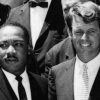Nationwide unrest has forced the black quisling class to reveal themselves as agents of the racial and economic status quo, writes Margaret Kimberley.
Tag: Martin Luther King Jr.
UPRISING: The Story of America Crashes Headlong Into the Reality of America
We are witnessing the head-on collision between the story America’s political, media and educational institutions tell Americans about what their country is, and the reality of what their country actually is, writes Caity Johnstone.
Remembering the FBI’s Vilification of Martin Luther King
Gandhi and American Civil Rights
Howard Thurman travelled to India and returned to the U.S. intent on bringing nonviolence to the struggles of African Americans, writes Walter E. Fluker.
Malcolm X Warned About These Bourgeois Hustlers
A Call to Reinvestigate American Assassinations
RFK and the End of an Era
A just published book on the RFK murder re-examines the evidences and asks what the world might be like if the four 1960s assassinations never occurred.
Distorting the Life of Bobby Kennedy
As the 50th anniversary of his assassination is being remembered on Tuesday, it is vital to have a complete and accurate picture of the complex figure of Robert F. Kennedy, explains James DiEugenio.
50th Anniversary of May 1968, Paris: Memories of an Illusory Revolution
The Washington Post’s ‘Breakthrough’ on the MLK Murder
Updated: The Washington Post broke with recent corporate media practice by daring to raise questions about who killed Martin Luther King Jr., as William F. Pepper and Andrew Kreig explain. (Updated with more on NPR’s coverage.)




